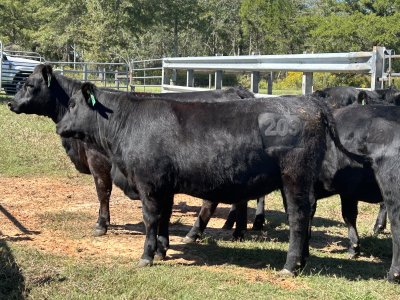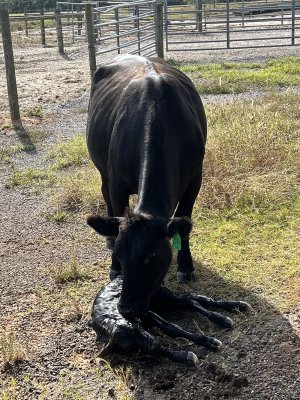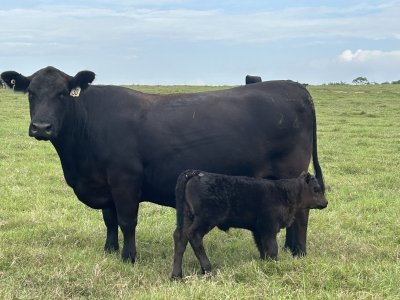This has not been a great calving season. Started with a bull calf that was 6 weeks early he made it but bw of 38 pounds is not our goal. 2nd calf stillborn heifer Another 6 weeks early…..crap then a first calf heifer with a 39# bull calf what the heck so you see the trend we ended up with 15 calves that were 6weeks to a month early. We are almost finished calving now just a dozen or so to go. One calf weighed 23 pounds folks I'm not making this crap up I had a friend tell me I better get a different bull lol I had to tell him there were 8 different bulls represented with these little calves, many leading AI sires. Cows are in great shape we have been in severe drought and heat has been brutal. One thing I know about raising cattle is once you think you have it figured out they will sure show you that you don't!
You are using an out of date browser. It may not display this or other websites correctly.
You should upgrade or use an alternative browser.
You should upgrade or use an alternative browser.
Crazy calving season
- Thread starter gizmom
- Start date

Help Support CattleToday:
Travlr
Well-known member
Are you using all the same breed bulls? All low birth weight? All calving ease? Cow sires all low birth weight? Are all the low birth weights premature? Some full term?This has not been a great calving season. Started with a bull calf that was 6 weeks early he made it but bw of 38 pounds is not our goal. 2nd calf stillborn heifer Another 6 weeks early…..crap then a first calf heifer with a 39# bull calf what the heck so you see the trend we ended up with 15 calves that were 6weeks to a month early. We are almost finished calving now just a dozen or so to go. One calf weighed 23 pounds folks I'm not making this crap up I had a friend tell me I better get a different bull lol I had to tell him there were 8 different bulls represented with these little calves, many leading AI sires. Cows are in great shape we have been in severe drought and heat has been brutal. One thing I know about raising cattle is once you think you have it figured out they will sure show you that you don't!
These are my first questions. I'm sure others will have similar thoughts and other questions will crop up.
the first calf was out of SAV Renown one was a Resource I only use low birthweight bulls on heifers. I rarely use a negative bw bull I don't want 50 pound calves I feel a heifer should be able to have a 70# calf. We are an Angus operation so all Angus bulls used. The 23 pound calf was a Coleman Juneau 044 out of a Coleman Donna cow. The calves were out of both mature cows and first calf heifers. Our heifers are managed differently than mature cows with heifers being supplemented. All cattle on mineral program wormed twice a year and vaccinated annually. The photos are to give you an idea of condition of the cattle first shot open heifers second is a young cow with her second calf that we had just pulled it was upside down and backwards so a rough delivery but alive and heifer weighed 75 pounds so we finally get the right size just a bad presentation Bot cow and calf doing fine. Last photo another small calf at birth as you can see cow is in good shape if I remember correctly calf was 60ish pounds cow is a Coleman Donna the calf is Coleman Triumph. We will be flushing this cow soon.Are you using all the same breed bulls? All low birth weight? All calving ease? Cow sires all low birth weight? Are all the low birth weights premature? Some full term?
These are my first questions. I'm sure others will have similar thoughts and other questions will crop up.
Attachments
kenny thomas
Well-known member
So what do you think caused it?
Ky hills
Well-known member
Have y'all talked with a vet?
1 calf might just be coincidental but that many is suspect.
I wonder if it could be some kind of plant toxicity due to the drought?
Heat stress?
1 calf might just be coincidental but that many is suspect.
I wonder if it could be some kind of plant toxicity due to the drought?
Heat stress?
I think heat and humidity I have talked to some friends that have had issues as well. This summer was brutal, if all the calves had been out of one bull I would have blamed the bull but that wasn't the case. As stated some were out of first calf heifers but just as many out of older proven cows. I went back to check past birth weights on the mature cows and none had ever had itty bitty calves which makes me think the combination of drought and heat was the problem. I am changing my AI breeding to January to try to avoid calving In September. In the past we AI heifers to calve the last week of September with cows starting to calve around the 2nd week of October. This year we had calves dropping in August and early Sept. our farm is about 30 miles from the Gulf of Mexico so needless to say humidity is a big factor.So what do you think caused it?
Mark Reynolds
Well-known member
- Joined
- May 30, 2023
- Messages
- 851
- Reaction score
- 1,037
Multiple calves, multiple bulls that are proven. There is something going on with the environment. My initial thought would be the forage/diet. I'd start with a good hard look at what is growing in your pastures. Overly mature fescue, black cherry trees, pine trees......and a host of other possible contributors. Get your extension agent to your pasture or an agent familiar with pasture forages and vegetation that can be toxic and have them conduct an inventory.
Yes after first couple of calves we talked to the vet, he is scratching his head over it with us. I would have been suspect of a toxin of some kind in feed but the mature cows are managed differently than the younger cows different man agent and pastures and had issues with both groups. when Mike sent me the text on the 23 pound calf I honestly thought it was a typo. So questioned him and he said nope 23 pounds he lived but what do you do with a dang 23 pound calf? He was born in Sept and I figure now might weigh 50 pounds.Have y'all talked with a vet?
1 calf might just be coincidental but that many is suspect.
I wonder if it could be some kind of plant toxicity due to the drought?
Heat stress?
Mark Reynolds
Well-known member
- Joined
- May 30, 2023
- Messages
- 851
- Reaction score
- 1,037
Heat and humidity are potential environmental factors, although I'm thinking it's more likely diet. But, any or all 3 could be causative or compounding factors. Changing the calving season will address the birth weight, but that will put your growing calves in the cross hairs of whatever the causative environmental factor was this next year. Take a hard look at the pasture vegetation, Plant some summer annuals. Practice 810 with the NRCS.I think heat and humidity I have talked to some friends that have had issues as well. This summer was brutal, if all the calves had been out of one bull I would have blamed the bull but that wasn't the case. As stated some were out of first calf heifers but just as many out of older proven cows. I went back to check past birth weights on the mature cows and none had ever had itty bitty calves which makes me think the combination of drought and heat was the problem. I am changing my AI breeding to January to try to avoid calving In September. In the past we AI heifers to calve the last week of September with cows starting to calve around the 2nd week of October. This year we had calves dropping in August and early Sept. our farm is about 30 miles from the Gulf of Mexico so needless to say humidity is a big factor.
I wish we had trees to blame it on but our farm is pretty bare of trees. We have looked for toxic weeds and plants but haven't identified any in any of our pastures.Multiple calves, multiple bulls that are proven. There is something going on with the environment. My initial thought would be the forage/diet. I'd start with a good hard look at what is growing in your pastures. Overly mature fescue, black cherry trees, pine trees......and a host of other possible contributors. Get your extension agent to your pasture or an agent familiar with pasture forages and vegetation that can be toxic and have them conduct an inventory.
Mark Reynolds
Well-known member
- Joined
- May 30, 2023
- Messages
- 851
- Reaction score
- 1,037
Do you have tall fescue?I wish we had trees to blame it on but our farm is pretty bare of trees. We have looked for toxic weeds and plants but haven't identified any in any of our pastures.
Mark Reynolds
Well-known member
- Joined
- May 30, 2023
- Messages
- 851
- Reaction score
- 1,037
The reason I ask, the endophyte, if in high enough concentrations, can cause vasoconstriction of blood vessels, which would compromise nutrients being delivered to the fetus essentially starving them and result in low birth weights, or even abortion. This could be exacerbated during periods of higher external temperatures, and would not be limited to your herd, but everyone with fescue in the approximate same stage of maturity in the area. Sound about right?
kenny thomas
Well-known member
I was there when the hurricane came ashore in September so i totally understand the heat and humidity.I think heat and humidity I have talked to some friends that have had issues as well. This summer was brutal, if all the calves had been out of one bull I would have blamed the bull but that wasn't the case. As stated some were out of first calf heifers but just as many out of older proven cows. I went back to check past birth weights on the mature cows and none had ever had itty bitty calves which makes me think the combination of drought and heat was the problem. I am changing my AI breeding to January to try to avoid calving In September. In the past we AI heifers to calve the last week of September with cows starting to calve around the 2nd week of October. This year we had calves dropping in August and early Sept. our farm is about 30 miles from the Gulf of Mexico so needless to say humidity is a big factor.
Is there any other cattle farms nearby that had the same problems? I have friends not far from you and haven't heard anything mentioned about this issue.
kenny thomas
Well-known member
No fescue there.Do you have tall fescue?
Travlr
Well-known member
Have you been feeding hay?Yes after first couple of calves we talked to the vet, he is scratching his head over it with us. I would have been suspect of a toxin of some kind in feed but the mature cows are managed differently than the younger cows different man agent and pastures and had issues with both groups. when Mike sent me the text on the 23 pound calf I honestly thought it was a typo. So questioned him and he said nope 23 pounds he lived but what do you do with a dang 23 pound calf? He was born in Sept and I figure now might weigh 50 pounds.
Just a thought and highly unlikely since you said other people around you have had similar issues... but is there any chance someone has had access to your semen tank?
Mark Reynolds
Well-known member
- Joined
- May 30, 2023
- Messages
- 851
- Reaction score
- 1,037
Really? Ok. I was expecting it to be quite common, but I'm not there either.No fescue there.
kenny thomas
Well-known member
Hardly any places that far south has fescue. It ends usually mid GA and AL. Im going to say that i have traveled pretty much all of Florida and have never seen tall fescue anywhere. Maybe the Agriculture Inspection Stations won't allow it in. Lol
Mark Reynolds
Well-known member
- Joined
- May 30, 2023
- Messages
- 851
- Reaction score
- 1,037
Different approach. What DO you have growing in the pastures? Even what you think is harmless.
Mark Reynolds
Well-known member
- Joined
- May 30, 2023
- Messages
- 851
- Reaction score
- 1,037
Ops! I looked at the wrong tags. Thought it said KY or TN. Yea, not a fescue issue in FL I wouldn't suspect.Hardly any places that far south has fescue. It ends usually mid GA and AL.
Mark Reynolds
Well-known member
- Joined
- May 30, 2023
- Messages
- 851
- Reaction score
- 1,037
Looking up Bermuda grass toxicity........The grass itself is not toxic. However, there is/are a couple of funguses that thrive in high heat and humidity that I found that could be suspect. The livestock effected was listed as horses, but your conditions were unusual and seem they may have been the right combination for a disaster that you weren't aware of.
I'm thinking of cases several years back in KY. Many horses were aborting but no one could figure it out. There were black cherry trees present, but the horses absolutely were not eating them. There was a serious bagworm population explosion on the black cherry trees that year. The bagworms were consuming the black cherry, pooping on the ground (grasses) which the horses ate, and the horses were being poisoned by the black cherry that way, and aborting.
I'm thinking of cases several years back in KY. Many horses were aborting but no one could figure it out. There were black cherry trees present, but the horses absolutely were not eating them. There was a serious bagworm population explosion on the black cherry trees that year. The bagworms were consuming the black cherry, pooping on the ground (grasses) which the horses ate, and the horses were being poisoned by the black cherry that way, and aborting.


